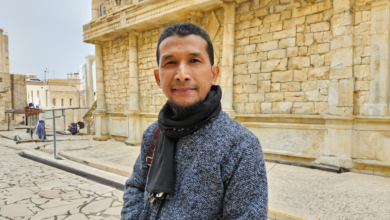
By: DR. Ahmad Lutfi Fathullah, MA
Almost every month in Rajab the author is asked about the validity of the traditions about the virtues of the month of Rajab, including the reward for people who fast in the month of Rajab or certain days in the month of Rajab.
This paper is made to answer these questions, which many authors take from several books, especially from the study of the author's dissertation and books Tabyin al-ajab fi fadail shahr Rajab by Ibn Hajar.
The virtues of the Month of Rajab
Hadith:
إِنَّ رَجَب شَهْرُ اللهِ ، وَشَعْبَانَ شَهْرِيْ ، وَرَمَضَانَ شَهْرَ أُمَّتِي.
Verily, Rajab is Allah's month, and Sha'ban is my month, and Ramadan is my ummah's month.
Takhrij Hadith: This Hadith is a piece of the long Hadith narrated by Ibn al-Jawzi in the book al-Maudu'at from Muh.ammad ibn Nasir al-Hafiz from Abu al-Qasim ibn Mandah from Abu al-Hasan Ali ibn Abdullah ibn Jahdam from Ali ibn Muhammad ibn Sa'ida al-Basri from his father from Khalaf ibn Abdullah from Humaid al-Tawil from Anas .[1]
Hadith Law: Maudu '/False.
In sanad This hadith contains Ali ibn Abdullah ibn Jahdam al-Suda'i, better known as Ibn Jahdam, he was accused of being a liar. The scholars who accused him of being a liar included:
While some other narrators are in sanad this is not recognized, even some scholars of Hadith say that maybe they are not yet born (لعلهم لم يخلقوا). This Hadith has been punished for being false by Ibn al-Jawzi, Ibn Qayyim, Ibn Hajar, al-Suyuti and others.[2]
The virtues of praying to the Prophet in the month of Rajab
Hadith:
رأيتُ لَيـْلَة َالمِعْرَاجِ نَهْرّا مَاءُهُ أَحْلَى مِنْ العَسَلِ ، وَأَبرَدَ مِنْ الثلجِ ، وأَمسْنْْ الِمِْْْ. فَقُلْتُ لِمَنْ هَذَا يَاجِبْرِيلَ؟
قَالَ: لِمَنْ صَلىَّ عَلَيْكَ فيِ رَجَبَ.
I saw at night a river whose water was sweeter than honey, colder than snow, more fragrant than moss. I also asked Jibril: Who is this for? Jibril answered: For those who pray to you in the month of Rajab.
Takhtij Hadith: This hadith has not been found in the narrator. Al-Kubawi who mentioned it in the book Durratu al-Nasihin quoted from the book Zubdat alwa'izin.[3]
Hadith Law: Maudu '/False.
Even though the narrator of this Hadith has not been found, al-Sakhawi said "وأما الصلاة عليه في رجب فلا يصح فيها شيئ". What he means: There is not a single Hadith regarding prayer to the Prophet (s) in the month of Rajab Sahih.[4] It is based on this rule that this Hadith is punished as false.
The virtue of praying on the night of the month of Rajab
Hadith:
من أحيا أول ليلة من رجب لم يمت قلبه إذا ماتت القلوب, وصب الله الخير من فوق رأسه صبا, وخرج من ذنوبه كيوم ولدته أمه, ويشفع لسبعين ألفا من أهل الخطايا قد استوجبوا النار.
Whoever lives (by worshiping) the first night of the month of Rajab, his heart will not die when careful to die. Allah will sow goodness from upon his head, and he will come out of his sins as if he was born from his mother's womb, and he will be given the right to intercede for seventy thousand sinners who have already gone to hell.
Takhrij Hadith: This hadith does not find the narrative, it is included in the two typical books about the hadiths about the month of Rajab written by Ibn Hajar and Ali al-Qari.
Hadith Law: Maudu '/False.
Even though he hasn't found the narrator of this Hadith, he can be punished as a fake Hadith based on the rules given by Ibn Hajar when he said:
"لم يرد في فضل شهر رجب, ولا في صيامه, ولا في صيام شيئ منه, ولا في قيام ليلة مخصوصة فيه, حديث صحيح يصلح للحجة, وقد سبقني إلى الجزم بذلك الإمام أبو إسماعيل الهروي الحافظ". ثم قال ”وأما الأحاديث الواردة في فضل رجب أو فضل صيامه أو صيام شيئ منه صريحة فهي على قسـمين: [5]".
The meaning:
There is no Hadith regarding the virtue of the month of Rajab, fasting in it, fasting on certain days in it, and worshiping on certain nights of the month, a valid Hadith that can be used as evidence / argument. Al-imam al-Hafiz Abu Isma'il al-Harawi has preceded me to confirm this. Then he also said: Regarding the Hadiths that exist about the virtue of Rajab, fasting or fasting on certain days in which it clearly mentions this, it is divided into two types: da'if and fake.
Before Ibn Hajar, Ibn Qayyim had also hinted at the rules as mentioned by Ibn Hajar. He said in the book al-Manar al-munif "كل حديث في ذكر صوم رجب وصلاة بعض الليالي فيه: فهو كذب مفترى". What he means: All the Hadiths regarding the fast of Rajab and prayers on certain nights of the month are outright lies. [6]
This Hadith is punished for being false because it is not listed in some Hadith weak mentioned by Ibn Hajar, means that he is a fake Hadith even though Ibn Hajar did not mention it directly but his gesture other than some of the da'if Hadith mentioned is false. Then he gave a small sample of the fake Hadith in question. Allah knows best.
من صلى بعد المغرب في ليلة من رجب عشرين ركعة يقرأ في كل ركعة فاتحة الكتاب والإخلاص وسلم عشر تسليمات حفظه الله تعالى وأهل بيته وعياله في بلاء الدنيا وعذاب الآخرة.
Whoever prays after maghrib on the night of the month of Rajab, twenty cycles, reads every cycles of al-Fatihah and al-Ikhlas, with ten greetings, then Allah will take care of him and protect his home and family from the world and the punishment of the hereafter.
Takhrij Hadith: Ibn al-Jawzi mentions a Hadith like this narrated by al-Jawzaqani rather than Anas ibn Malik with the final word: حفظه الله تعالى في نفسه وماله وأهله وولده وأجير من عذاب القاله وماله وأهله وولده وأجير من عذاب القارع من عذاب القاله وزبده وأجير من عذاب القارع من[7]
Hadith Law: Maudu '/False.
This hadith has been condemned to be false by several scholars such as Ibn al-Jawzi, Ibn Qayyim, Ibn Hajar, al-Suyuti, Ali al-Qari, al-Shawkani and Ibn 'Arraq. The reason is, as said by Ibn al-Jawzi, mostly from internal narrators sanad The hadith is an unrecognized narrator (مجاهيل).[8] This hadith is included in the rules mentioned by Ibn Hajar above.
The traditions of the Raghaib prayer
ما من أحد يصوم أول يوم من رجب ثم يصلي بين العشاء والعتمة اثني عشر ركعة يفصل بين ركعتين بتسليمة يقرأ في كل ركعة بفاتحة الكتاب مرة وإنا أنزلناه في ليلة القدر ثلاث مرات, وقل هو الله أحد اثني عشرة مرة, فإذا فرغ من صلاته صلى علي سبعين مرة يقول: اللهم صل على محمد النبي الأمي وعلى أله, ثم يسجد ويقول في سجوده سبعين مرة: رب اغفر وارحم وتجاوز عما تعلم إنك أنت الأعز الأكرم, ثم يسجد سجدة أخرى ويقول فيها مثل ما قال في السجدة الأولى ثم يسأل حاجته في سجوده فإنها تقضى .
Whoever fasts on the first day of the month of Rajab, then prays at the time between Isha 'and Fajr for twelve cycles, with one greeting every two rakats, reads Surah al-Fatihah once per rak and Surat al-Qadr three times and surah al-Ikhlas. Twelve times. After he finished praying he prayed to me (the Prophet) seventy times by reading: اللهم صل على محمد النبي الأمي وعلى أله. Then he prostrated and read: رب اغفر وارحم وتجاوز عما تعلم إنك أنت الأعز الأكرم seventy times, Then he prostrated again by reading the same reading as the first prostration, then he asked his request in prostration, then his request would be granted.
Another hadith regarding prayer al-ragha'ib This is:
لا لي الصلاة لا له الله الى لو انت ل البحر الرمال الجبال الأشجار القيامة ائة ا الأهل .
It is not that a person performs this prayer unless Allah will forgive all his sins, even as much as the sand and foam of the sea water, as heavy as a mountain and as many as the leaves on the stick. On the Day of Resurrection, he will give syafa'at to the seven hundred experts of his family who inhabit hell.
These traditions mentioned by Al-Ghazali are also in Yes, '' ulum al-din. al-'Iraqi said that he was mentioned by Ruzayn in his book.[9]
Hadith Law: Maudu '/False.
Hadith scholars such as Ibn al-Jawzi, Ibn S.alah., Ibn Qayyim, al-'Iraqi, al-Suyuti, Ibn 'Arraq and others said that these hadiths are false. Even Abu Shamah has discussed it at length in his book al-Ba'ith 'Ala inkar al-bid' wa al-hawadith. All of them condemn this Hadith as fake.[10]
The virtues of fasting in the month of Rajab.
ألا إن رجب شهر الله الأصم, فمن صام منه يوما إيمانا واحتسابا استوجب عليه رضوان الله الأكبر, فمن صام منه يومين لا يصف الواصفون من أهل السماء والأرض ماله عند الله من الكرامة, ومن صام ثلاثة أيام عوفي من كل بلاء الدنيا وعذاب الآخرة والجنون والخذام والبرص ومن فتنة الدجال, ومن صام سبعة أيام غلقت عنه سبعة أبواب جهنم, ومن صام ثمانية أيام فتحت له ثمانية أبواب الجنة, ومن صام عشرة أيام لم يسأل من الله شيئا إلا أعطاه, ومن صام خمسة عشر يوما غفر الله تعالى ذنوبه ماتقدم وبدله بسيآته حسنات ومن زَادَ ، زَادَ اللهُ أَجْرَهُ.
Verily, Rajab is the month of Allah who ... So whoever fasts in that month one day with full faith and hope, he will definitely get a great Rida Allah. And whoever fasts in that month for two days, he will get something that the inhabitants of heaven and earth cannot attribute to his glory with Allah. And whoever is fasting for three days will be kept away from the world and the punishment of the hereafter, and mad illness, ..., and from the test of Dajjal. And whoever fasts seven days will be closed on it the seven gates of hell. And whoever is fasting for eight days is opened for him the eight gates of heaven, and whoever is fasting for ten days does not ask for anything from Allah unless it will be granted. And whoever fasts for fifteen days will be forgiven his previous sins and all his mistakes will be replaced with goodness. And whoever fasts more than that, Allah will also add more rewards.
Takhrij Hadith: This hadith was narrated by al-Bayhaqi in al-Shu'ab and Fada'il al-awqat and al-Asfahani in al-Targhib. All through 'Uthman ibn Matar from' Abd. Ghafur from 'Abd' Aziz ibn Sa'id from his father.[11]
Hadith Law: Maudu '/False.
In sanad al-Bayhaqi there are several narrators who are weak, very da'if and one who is accused of narrating false Hadith rather than narrators tsiqat. Among them are 'Uthman ibn Matar, he is da'if according to Abu Hatim, al-Nasa'i, al-Dhahabi and Ibn Hajar. Abu Salih 'Abd. al-Gahafur al-Wasiti, according to al-Bukhari they left him and his Hadith evil (تركوه وهو منكر الحديث). Ibn 'Adiy said: He is da'if and his Hadith evil (ضعيف منكر الحديث). Al-Nasa'i thought he was متروك الحديث. Ibn Hibban also stated that he narrated false Hadiths rather than narrators tsiqat (كان يروي الموضوعات عن الثقات).
Al-Bayhaqi who narrated this Hadith only said that sanadnew weak, however, Ibn Hajar who was followed by Ibn 'Arraq falsely punished him.[12]
صَوْمُ أَوَّل يَوْمٍ مِنْ رَجَب كَفَّارَة ثَلاَثَ سِنِيْنَ ، وَالثاني كَفَّارَة سَنَتَيْنِ َ والة سثنََ
ُثمَّ كُل يَوْمٍ كَفارَة شَهْرٍ.
Fasting on the first day of the month of Rajab takes away the sins of three years, fasting on the second day takes away the sins of two years, and fasting on the third day removes the sins of one year, then each subsequent day will take away the sins of a month.
Takhrij Hadith: This hadith as hinted at by al-Suyuti, was narrated by Abu Muhammmad al-Khallal in Fada'il Rajab than Ibn 'Abbas.[13]
Hadith Law: Maudu '/False.
Al-Suyuti punished this Hadith with weak, however, al-Munawi said very much weak, then he quoted the opinion of Ibn Salah and Ibn Rajab al-Hambali which hinted at the falsity of the Hadiths regarding the fasting of Rajab. Al-Albani only menweakright this Hadith.[14]
This hadith can be punished as false based on the rules mentioned by Ibn Qayyim and Ibn Hajar as explained in the 154th Hadith.
إنه r لمَ ْ يَصُمْ بَعْدَ رَمَضَانَ إِلاَّ رَجَب وَشَعْبَانَ.
Indeed, Rasulullah saw had never fasted other than the month of Ramadan except for Rajab and Sya'ban.
Takhrij Hadith: This hadith was narrated by al-Bayhaqi in al-Shu'ab than Abu Hurairah.[15]
Hadith Law: Weak.
Al-Bayhaqi said that sanad This hadith weak.[16]
Hadith:
إِنَّ فيِ الجَنّةِ نَهْرًا يُقَالُ لَهُ رَجَب أَشَدّ بَيَاضًا مِنْ اللبنِ وَأَحْلَى مِنْ العَسَلِ بِيَاضًا مِنْ اللبنِ وَأَحْلَى مِنْ العَسَلِ َ مَنْ َِ
لِكَ النَهَارِ.
Indeed, in heaven there is a river, it is called the Rajab river. The water is whiter than milk, sweeter than honey, whoever fasts one day in the month of Rajab, Allah will give him a drink from that river.
Takhrij Hadith: This hadith was narrated by Ibn Hibban in al-Majruhin and al-Bayhaqi in Fada'il al-awqat and al-Shayrazi in al-Alqab as hinted by al-Suyuti. Everything from the history of Anas.[17]
Al-Khubawi suggests that this Hadith was narrated by al-Bukhari and Muslim.[18] But this gesture is wrong because al-Bukhari and Muslim did not narrate this Hadith and not a single Hadith scholar has hinted in that direction, what else this Hadith is very weak, some scholars even punished him for being a fake. So it is impossible for both of them to have narrated this Hadith.
Hadith Law: Weak.
This hadith has been punished as false by some scholars such as Ibn al-Jawzi, al-Dhahabi and Ibn Hajar in Lisan al-Mizan. The reason is inside sanad This hadith contains a liar narrator, namely Mans.ur b. Yazid. Ibn al-Jawzi said that deep sanadmany are unknown (فيه مجاهيل).[19]
However, al-Suyuti and Ibn Hajar are in the book Tabyin al-'Ajab only me weak This Hadith is different from his punishment for this Hadith in Lisan al-Mizan as described above. He said " Isnadit is am weak, however, he hasn't made this Hadith a fake ”.[20]
كل الناس جياع يوم القيامة إلا الأنبياء وأهليهم وصائم رجب وشعبان ورمضان, فإنهم شباع لاجوع لهم ولا عطش.
Everyone will starve on the Day of Resurrection except the prophets and their families, as well as those who fast in Rajab, Sha'ban and Ramadan.
Takhrij Hadith: Hadith with lafaz like this could not be found. Al-Khubawi quoted it from the book Zubdat al-wa'iz.in.[21]
Hadith Law: Maudu '/False.
This hadith can be punished as false based on the rules mentioned by Ibn Hajar and Ibn Qayyim as mentioned above.
يا ثوبان ، هؤلاء يعذبون في قبورهم ، ودعوت لهم فخفف الله عنهم العذاب. ثم قال: ياثوبان لو صام هؤلاء يوما من رجب وما ناموا منه ليلة ما عذبوا في قبورهم. قلت: يا رسول الله أصوم يوم وقيام ليلة منه يمنع عذاب القبر؟ ثم قال: ياثوبان, والذي بعثني بالحق نبيا, ما من مسلم ومسلمة يصوم يوما ويقوم ليلة من رجب يريد بهما وجه الله, إلا كتب الله له عبادة سنة صام نهارها وقام ليالها.
O Thawban, they are punished in their graves, I pray for Allah to ease their torment. Then the Messenger of Allah said: O Thawban, if one of them fasts in the month of Rajab, and they do not sleep at night all night, surely they will not be tortured in their graves.
I (Thawban) said: O Messenger of Allah, can fasting one day and qiyamullah one night prevent people from tormenting the grave. Rasulullah SAW replied: O Thawban, for the sake of the Substance whose life is in His hands, neither a Muslim nor a Muslimah fasts one day in the month of Rajab, and qiyamul lail one night, wishing Allah's pleasure, unless it will be written by Allah as a worshiper a year in which the morning is fasting and the night is qiyam al-lail.
Takhrij Hadith: Hadith with lafaz like this could not be found. Al-Khubawi quoted it from the book Rawnaq al-majalis.[22]
Hadith Law: Maudu '/False.
Hadith 8:
This hadith can be punished as false based on the rules mentioned by Ibn Hajar and Ibn Qayyim as described in the 154th Hadith.
Fiqh of Worship in the Month of Rajab
There is a little anxiety in the heart when a hadith relating to a ritual is falsely punished by hadith scholars. There is a further impression as a result of the anxiety, namely, is the worship that has been routinely carried out and it turns out that the hadith is fake, then the worship becomes bid'ah and is useless?
It should be noted that false hadiths do not affect fiqh laws which are constructed with authentic hadiths or verses of the Koran. For example, fasting is a practice that is prescribed by Islam, of course, with rules that are both understandable. It can be done at any time except for certain days, namely 5 or 6 days in a year. Apart from being prescribed, fasting is a good deed which of course is rewarding. It's just that, how much reward one gets when fasting, only Allah and His Messenger know, that is, only through the Koran and authentic hadiths we can know the amount of that reward, scholars, whoever the person is, cannot know the amount of reward. . Those with understanding can say that this is a reward because it is righteous deeds, how much is the reward, Allah knows best.
Thus, those who perform night prayers, fast and pray in the month of Rajab, will still get reward, it's just that the reward promised or given is not as detailed in the false traditions.
Bid'ah or not fasting in the month of Rajab or praying at night, of course not as long as the basis of practice is not motivated by a false hadith.
Why are there still such false traditions?
The emergence of such false hadiths cannot be separated from the wrong nawaitu of the creators. The hadith above which was punished for being false because it was clearly not the words or the words of the Prophet, all were the words of people who were ordained to the prophet to obtain legal legitimacy. Of course the Prophet new ' (regardless) of the legal responsibility / conclusions generated. Those who fabricate the hadiths like the one above are mostly caused by their desire to invite people to do good. But their way is wrong, namely on behalf of the prophet and they make up the reward of a practice. There were two lies that were carried out, first determining / making up the reward and second telling this lie as the words of the Prophet.
[1] Ibn al-Jawzi, al-Maudu'at, vol. 2, p. 125.
[2] Ibid; Ibn Qayyim, al-Manar al-munif, p. 95-96; Ibn H.ajar, Tabyin al-'ajab, p. 19-21; al-Suyuti, al-La'ali ', vol. 2, p. 55-56.
[3] al-Khubawi, Durrat al-wa'izin, p. 45.
[4] al-Sakhawi, al-Qawl al-badi ', p. 298.
[5] Ahmad ibn 'Ali ibn Hajar al-Asqallani, Tabyin al-'ajab bima wurida fi fadl Rejab, Dar al-Kutub al-Ilmiyyah, Bayrut, 1988, p. 11 and 14.
[6] Ibn Qayyim, al-Manar al-munif, p. 96.
[7] Ibn al-Jawzi, al-Maudu'at, vol. 2, p. 123; Ibn Qayyim, al-Manar al-munif, p. 96, al-Suyuti, al-La'ali 'al-masnu'ah, vol. 2, p. 55-56; 'Ali al-Qari al-Asrar al-marfu'ah, p. 461; Ibn Arraq, Tanzih al-shari'ah, vol. 2, p. 90; al-Shawkani, al-Fawa'id al-majmu'ah, p. 47.
[8] Ibid; Ibn H.ajar, Tabyin al-'ajab, p. 20-21.
[9] al-Ghazali, al-Ihya ', vol. 1, p. 267; al-'Iraqi, al-Mughni, vol. 1, p. 267.
[10] Ibn al-Jawzi, al-Maudu'at, vol. 2, p. 125; Ibn Qayyim, al-Manar al-munif, p. 95-96; al-'Iraqi, al-Mughni, vol. 1, p. 267; al-Suyuti, al-La'ali ', vol. 2, p. 56; Ibn 'Arraq, Tanzih al-shari'ah, vol. 2, p. 89; Muhammad ibn 'Abd. Rahman Isma'il ibn Ibarahim @ Abu Shamah, al-Ba'ith 'ala inkar al-bid' wa al-hawadith, Dar al-Rayah, al-Riyad., 1990, p. 138-244.
[11] al-Bayhaqi, Shucab al-iman, vol. 3, p. 368, p. 3801; al-Bayhaqi, Fada'il al-awqat, p. 92-93; al-Asfahani, al-Targhib, vol. 2, p. 392, p. 1849.
[12] al-Bayhaqi, Fada'il al-awqat, p. 90; al-Haythami, Majma 'al-zawa'id, vol. 3, p. 188; Ibn Hajar, Tabyin al-'ajab, p. 20-24; Ibn 'Arraq, Tanzih al-shari'ah, vol. 2, p. 158; and see the biography of 'Uthman ibn Matar in al-Dhahabi, Mizan al-I'tidal, vol. 3, p. 53-56; Ibn Hajar, Taqrib al-tahdhib, p. 386; And the biography of 'Abd. al-Ghafur in Ibn Hibban, al-Majruhin, vol. 2, p. 148; al-Dhahabi, Mizan al-I'tidal, vol. 2, p. 55; al-Halabi, al-Kashf al-Hathith, p. 171.
[13] al-Suyuti, al-Jami 'al-saghir, vol. 1, p. 70.
[14] al-Suyuti, al-Jami 'al-saghir, vol. 1, p. 70; al-Munawi, Fayd al-Qadir, vol. 4, p. 210-211; Muhammad Nasir al-Din al-Albani, Da'if al-Jami 'al-saghir wa ziyadatih, al-Maktab al-Islami, Bayrut, 1979, vol. 3, p. 272, p. 2499.
[15] al-Bayhaqi, Shu'ab al-iman, vol. 3, p. 369, p. 3803.
[16] Ibid.
[17] Ibn Hibban, al-Majruhin, vol. 2, p. 238; al-Bayhaqi, Fada'il al-awqat, p. 90-91, p. 8; al-Suyuti, al-Jami 'al-saghir, vol. 1, p. 312; al-Munawi, Fayd al-Qadir, vol. 2. p. 470.
[18] al-Khubawi, Durrat al-Nasihin, p. 46.
[19] Ibn al-Jawzi, 'Ilal al-mutantahiya, vol. 2, p. 65; al-Dzahabi, Mizan al-I'tidal, vol. 4 p. 189; Ibn Hajar, Lisan al-Mizan, vol. 3. p. 348.
[20] Ibn Hajar, Tabyin al-'magic, p. 29; al-Suyuti, al-Jami 'al-saghir, vol. 1, p. 312.
[21] al-Khubawi, Durrat al-Nasihin, p. 47.
[22] Ibid.
Source: http://pusatkajianhadis.com/hadis-hadis-seputar-rajab/



